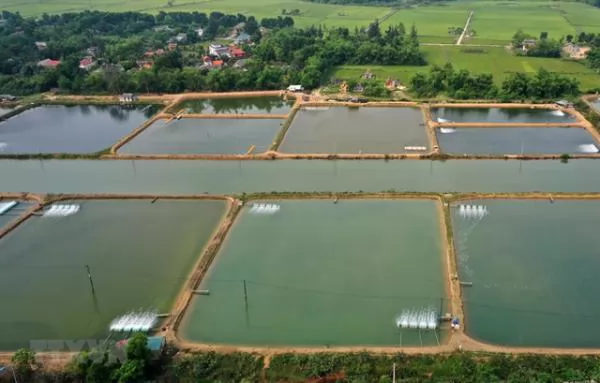Tuyên Quang rabbit farmer profits from raising New Zealand breed
TUYÊN QUANG – Raising New Zealand rabbits is providing a good income – about VNĐ200 million (US$8,600) net profit per year – to Nguyễn Công Định, living in the northern province of Tuyên Quang, as restaurants have a high demand for rabbit meat.
Currently, Định’s rabbit farm in Trường Sinh Commune, Sơn Dương District has over 3,000 New Zealand rabbits, including 250 pairs of parents.
In 2018, he signed a contract providing meat and baby rabbits to Tam Đảo livestock cooperative in Vĩnh Phúc Province, which was the supplier of rabbits to Nippon Zoki Vietnam Co., Ltd.
On average, Định’s farm provides 400 to 450 rabbits every month (at VNĐ70,000-80,000/kg) and a considerable amount of baby rabbits (VNĐ70,000-100,000/kg).
“The most important factors to farmers are techniques and breed selection. But raising New Zealand rabbits is also simple. The cages need to be cool and clean.”
Định said “My farm’s rabbits are growing well. The reproductive rate of the parent-rabbit pairs is increasing.”
“To meet the increasing cage facilities, I expanded the breeding area to 500sq.m from 200 sq.m in 2016.”
“I have invested VNĐ500 million in the middle of last year to expand cages, install ventilation and cooling systems so the rabbits can develop well,” he said.
Nguyễn Thị Nguyệt, Secretary of the Trường Sinh Commune Party Committee, said that the rabbit raising model of Nguyễn Công Định was one of the typical household examples in the area.
“Not only bringing high economic efficiency for the family, Định’s farm is providing quality baby rabbits to local breeders.”
In Định's experience, the New Zealand rabbit provided 30-40 per cent of meat compared to the body weight.
The main food sources for the rabbits were rice, bran, banana, vegetables and grass, which are always available in the countryside. However, it was important that leftovers need to be discarded and food shouldn’t be mouldy, which could easily cause diarrhoea. Additionally, breeders need to pay attention to the temperature of the rabbit and vaccinate them regularly.
Compared to normal rabbits, New Zealand rabbits have many advantages in size and body weight. A ready-to-sell rabbit has an average weight of 2.3kg and baby rabbits after being raised for more than four months and weighing over 2kg can be sold.
If breeders take care of them and raise them properly, the rabbit will gain weight fast. On average, a female rabbit can have 6-9 litters, with about 7-10 kits each time, according to Định.
After retiring from the army Định, 35, said he returned home and had worked in many different jobs, from carpentry, shoe repair to bonsai planting. “However, the income wasn’t stable, I determined to find a new direction to provide for my family.”
“I realised that the garden at the back of the house was large. Although my family has planted a number of fruit trees, there wasn’t much profit,” Định said.
“So, in 2015, I decided to build cages to develop a small-size husbandry.”
In 2015, through studying books and newspapers, as well as being introduced by some friends, Định started to get acquainted with the New Zealand rabbits.
He saw that it was an imported breed with high weight, was easy to raise, reproduce a lot, with delicious meat, and the most important thing was the high price in the market.
"I originally bought three pairs of parent rabbits to experiment with raising at home."
At first, because Định had no experience in raising rabbits, he faced many difficulties, saying: “The rabbits were often sick.”
Soon, he learned techniques of raising rabbits through books and agricultural documents.
He went to large rabbit raising farms in Vĩnh Phúc and Bắc Giang provinces, to learn more about breeding techniques and how to take care of sick rabbits.
“This is a completely new field for me. In the process of raising, I see rabbits grow slowly, often suffering from diarrhoea,” he said.
“At that time, I suffered from depression. Sometimes I intended to give up, but I received encouragement from my family, so I kept trying.”
After having accumulated a lot of experience, mastering raising techniques, with savings and loans from relatives, Định has bravely invested in building a rabbit breeding area and buying more baby rabbits since 2016.
In the process of raising rabbits, he has constantly visited and gained more experience from successful farms, participated in technique training courses in and outside the province. –VNS
Maybe you are interested

Transparency is crucial to help pork market recover
HÀ NỘI — Transparency is key to better protect the interests of businesses and customers in the pork market.

Trà Vinh expands lucrative high - tech shrimp farming
TRÀ VINH - The Cửu Long (Mekong) Delta province of Trà Vinh is encouraging farmers in coastal areas to expand high - tech shrimp breeding by using super - intensive farming since the model is sustainable and offers high profits, according to the province's Department of Agriculture and Rural Development.

Long An breeds brackish-water shrimp
LONG AN — The Cửu Long (Mekong) Delta province of Long An plans to invest more than VNĐ1.24 trillion (US$53 million) to develop brackish water shrimp cultivation in the 2020-25 period, according to its Department of Agriculture and Rural Development.





